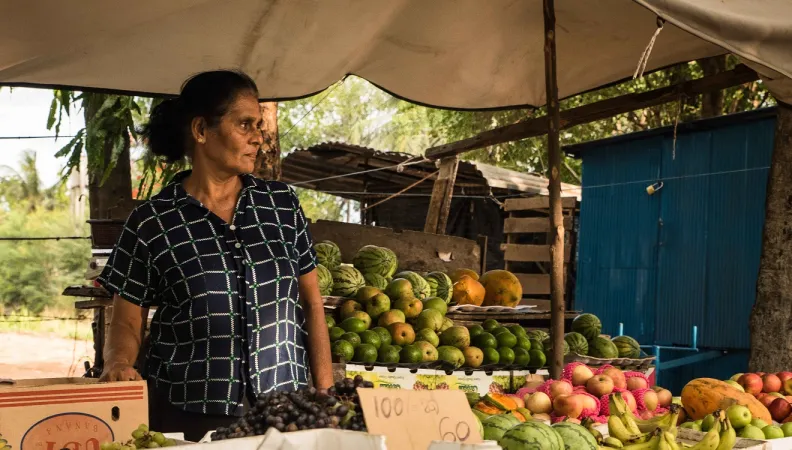Share the page
Economic transition Strategy: "Centring the Economy on People and the Planet"
Published on

Achieving the Sustainable Development Goals also means transforming the economy. AFD Group’s Strategy for the economic and financial transition is supporting this change of approach. We speak to Emmanuelle Riedel-Drouin, Director of AFD’s Economic and Financial Transition Department, Jean-Marc Liger, Director of Strategy and Prospective at Proparco, and Isabelle Valot, Director of the Economic and Financial Governance Department at Expertise France.
AFD has just published its strategy for the economic and financial transition. Why is this necessary?
Emmanuelle Riedel-Drouin, Director of AFD’s Economic and Financial Transition Department: This strategy envisions an economy as people-centred, while also taking the planet into account. Multiple tensions and crises are challenging our current economic and financial models. To transform the economy in a world striving for more sustainability, we need to shift our economic and financial models from their sometimes short-term mould, towards the longer term. Like health, education or climate, the economy and finance, are key factors in realizing the Sustainable Development Goals (SDGs) championed by the United Nations.
How would you sum up this strategy?
E. R-D.: Before, reflection on the models of production, consumption and investment in the projects supported by AFD Group (AFD – Proparco – Expertise France) was not systematic. This 2021–2025 Strategy accompanies the transformation of economies in the countries we operate in, to build an economic, social but also environmental ecosystem sustainable in the long term.
In this process, resource-efficiency, inclusion and resilience are the three fundamental markers structuring our activities to support our partners in developing new ways of producing, consuming and financing. Resource-efficiency because this secures the sustainable management of natural, financial, technological and human resources. Inclusion because this implies a well-balanced distribution of these resources, as well as access to economic and financial opportunities for excluded populations. And resilient because this enables us to adapt better to crises.
In AFD Group’s activities, how is this strategy applied?
E. R-D.: Six main activities guide our choices. First, we support the development of productive systems rooted in local economies. Then comes our support for the setting-up of adapted financial services that are sustainable, responsible and accessible to as many people as possible. The third pillar guiding our activities is support for sustainable trade and commerce, which can create a good balance between economic, social and environmental impacts. The Group also encourages companies and financial institutions, particularly development banks, to adopt good production, consumption and financing practices. It also supports the development of risk-management tools to better mitigate uncertainty. Lastly, we assist States in steering and regulating economic and financial activities.
A dozen indicators will enable us to measure the impact of our activities by linking them with the Group’s other priorities, such as the fight against climate change, gender questions, and our work in fragile areas.
This strategy is designed as a Group effort. What role does Proparco have in this process?
Jean-Marc Liger, Director of Strategy and Prospective at Proparco: As the Group’s private-sector financing arm, Proparco is fully involved in the economic and financial transition. Our role is to support private-sector economic actors in their transition. These can include companies, banks, or investment funds.
The success of the economic and financial transition depends on an effective link-up between the public and private sectors. It also depends on channelling private finance into responsible investments. One example: our work with investment funds and banks to support their clients’ businesses in a low-carbon strategy. Another example, we mobilise financial actors for investments in the green economy, renewable energies, etc.
How is Expertise France contributing to this strategy?
Isabelle Valot, Director of the Economic and Financial Governance Department at Expertise France: Our role is above all focused on providing transversal technical assistance to foster the growth of an enabling business climate for this economic and financial transition. Our systemic approach brings together technical skills from the public sector and the corporate world to respond to the expectations of our different institutional partners. Our experts work in a wide variety of areas, such as support for public policies promoting entrepreneurship and trade, public-private partnerships (PPPs) or customs and tax regulation. This crosscutting dimension is helping to lay the ground for economic and financial ecosystems built in line with the transition.
Launched in March 2021, does this strategy have sound foundations?
Emmanuelle Riedel-Drouin: The activities linked to the economic and financial transition already accounted for €3.5 billion out of €14.1 billion of Group commitments in 2019, which represents one-quarter of our business plan. Adopting this strategy will simply strengthen practices that are already firmly rooted in our activities.
- Download the Economic and Financial Transition Strategy 2021-2025
- Download an infographic about AFD Group's Economic and Financial Transition Strategy
- Learn more about the Economic and Financial Transition Strategy online
